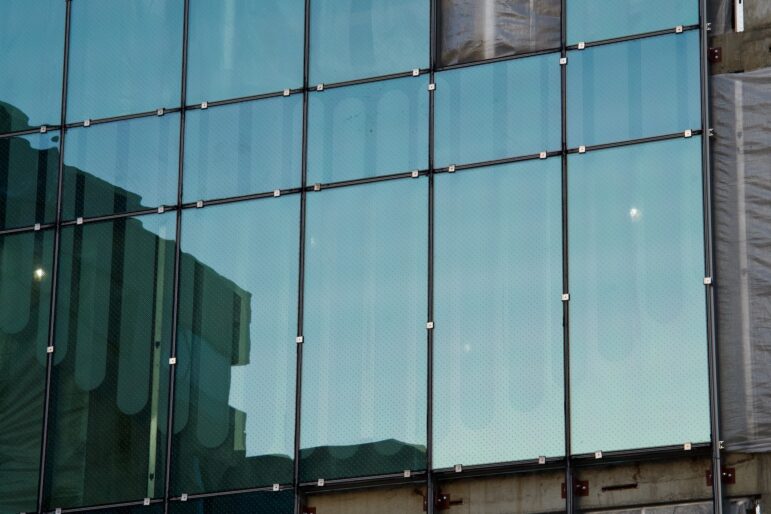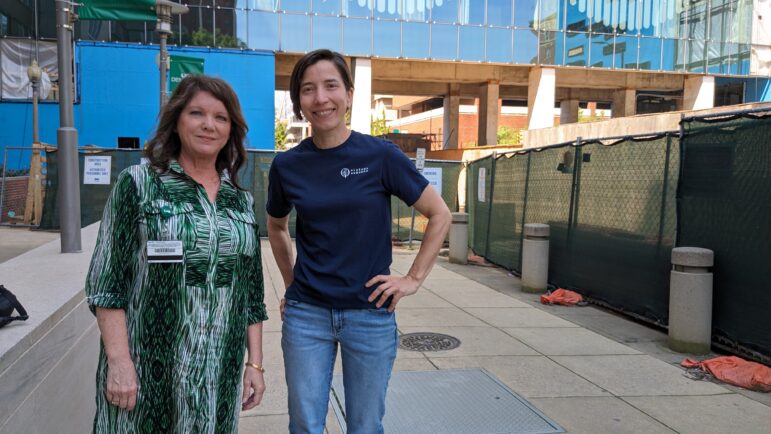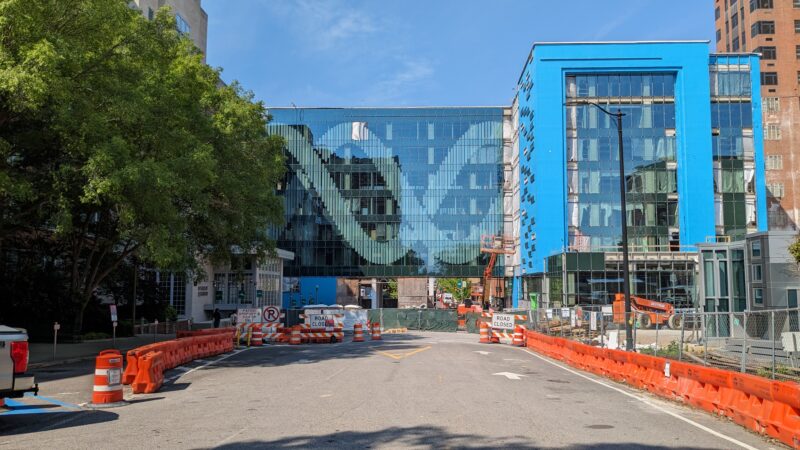UAB building among Alabama’s first to feature ‘bird safe’ glass
UAB's Altec/Styslinger Genomic Medicine and Data Sciences Building is under construction near the intersection of 7th Ave. S and 20th St. S.
On a recent afternoon, the University of Alabama at Birmingham’s new genomics building shimmers above 7th Avenue South, marked with the iconic image of a double helix.
From afar, the building looks to be made of regular glass, reflecting nearby structures and trees, but upon closer inspection, small dots etched into the glass are visible.
“This is our first building that features bird protective glass,” said Bambi Ingram, manager of UAB’s sustainability program.

The material is a seemingly simple fix to a chronic problem.
Window collisions are the second leading cause of bird deaths, responsible for as many as two billion mortalities or more every year in the US, according to a recent study.
“I don’t want people to think that, ‘Oh, it’s just these big buildings and it’s just in the city,’” said Lianne Koczur, science and conservation director at Alabama Audubon. “This is a problem for all of us. Everywhere there’s glass, there’s the potential for birds to hit it.”
Koczur said the animals see a reflection in the window, rather than identifying the glass as an object, and fly directly into skyscrapers and homes.
To keep birds away, the solution is to break up the reflection with small dots placed on the outside surface of a building, ideally two inches apart.
“Anything placed on the inside of the window isn’t going to be effective, because you’re still going to have that reflection,” Koczur said. “And the fact that they’re spaced two inches by two inches apart, that’s like a bird’s field of vision. That’s enough for a hummingbird to notice it and not fly into it.”
Through its Project Safe Flight, Alabama Audubon recruits volunteers to monitor window collisions across the state, and they work with residents and business owners to take preventative action.
The non-profit has helped apply window stickers to a few existing buildings in Alabama, including the Alabama Wildlife Center at Oak Mountain State Park and Kinetic Communications on Morris Ave.
Koczur said it’s a good option for retroactively bird proofing a building. But installing etched glass from the ground up is like the gold standard.
She said UAB’s genomics building is likely the first in the state to incorporate the material.

The bird-safe glass could help protect lots of species.
“You’d be surprised what is flying through this urban area during migration,” Koczur said. “We’ve found lots of cedar wax wings, but also some of our warblers, oven birds, worm-eating warblers, hooded warblers.”
“People don’t think of urban spaces as being places for habitat, but they are,” said UAB’s Ingram.
Ingram said the bird safe glass doesn’t add much cost to the overall project expense. She said UAB plans to use the same material for future buildings, including the new biomedical research and psychology building currently under construction.
EDITOR’S NOTE: UAB holds WBHM’s broadcast license, but our news and business departments operate independently.
New York Giants hire John Harbaugh as coach after identifying him as their top choice
Harbaugh joins the Giants 11 days after he was fired by the Baltimore Ravens. The Super Bowl champion is now tasked with turning around a beleaguered franchise.
US launches new retaliatory strike in Syria, killing leader tied to deadly Islamic State ambush
A third round of retaliatory strikes by the U.S. in Syria has resulted in the death of an Al-Qaeda-affiliated leader, said U.S. Central Command.
NASA rolls out Artemis II craft ahead of crewed lunar orbit
Mission Artemis plans to send Americans to the moon for the first time since the Nixon administration.
Trump says 8 EU countries to be charged 10% tariff for opposing US control of Greenland
In a post on social media, Trump said a 10% tariff will take effect on Feb. 1, and will climb to 25% on June 1 if a deal is not in place for the United States to purchase Greenland.
‘Not for sale’: massive protest in Copenhagen against Trump’s desire to acquire Greenland
Thousands of people rallied in Copenhagen to push back on President Trump's rhetoric that the U.S. should acquire Greenland.
Uganda’s longtime leader declared winner in disputed vote
Museveni claims victory in Uganda's contested election as opposition leader Bobi Wine goes into hiding amid chaos, violence and accusations of fraud.






